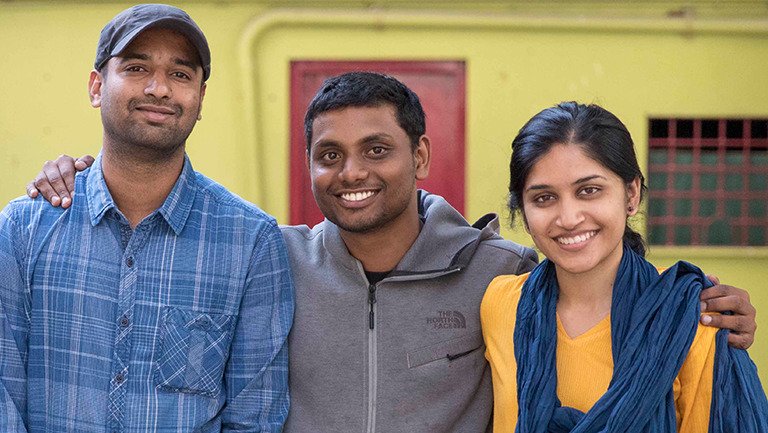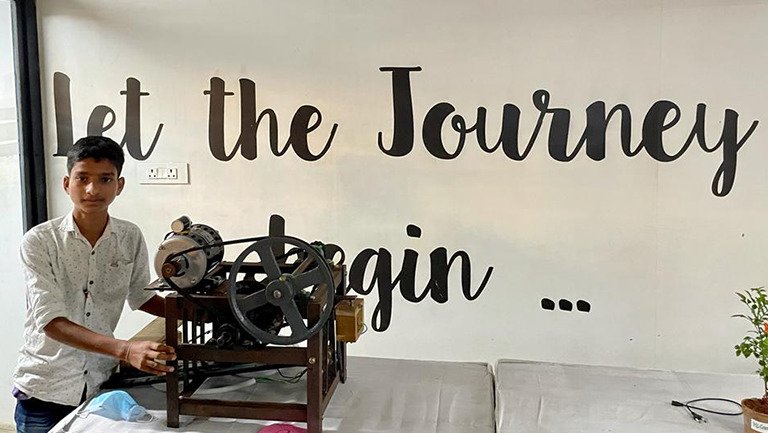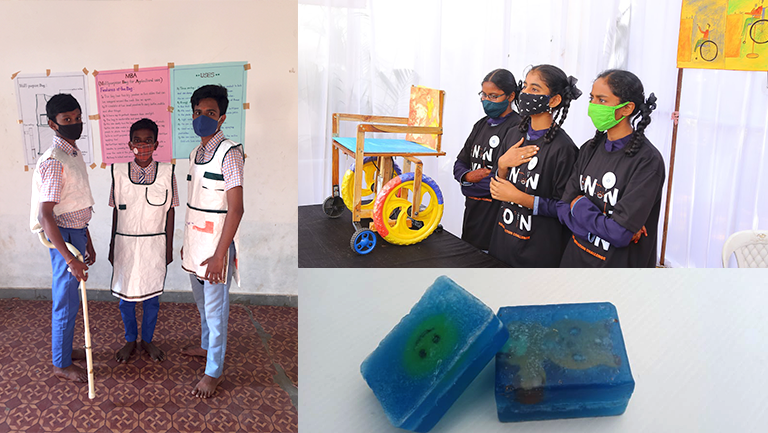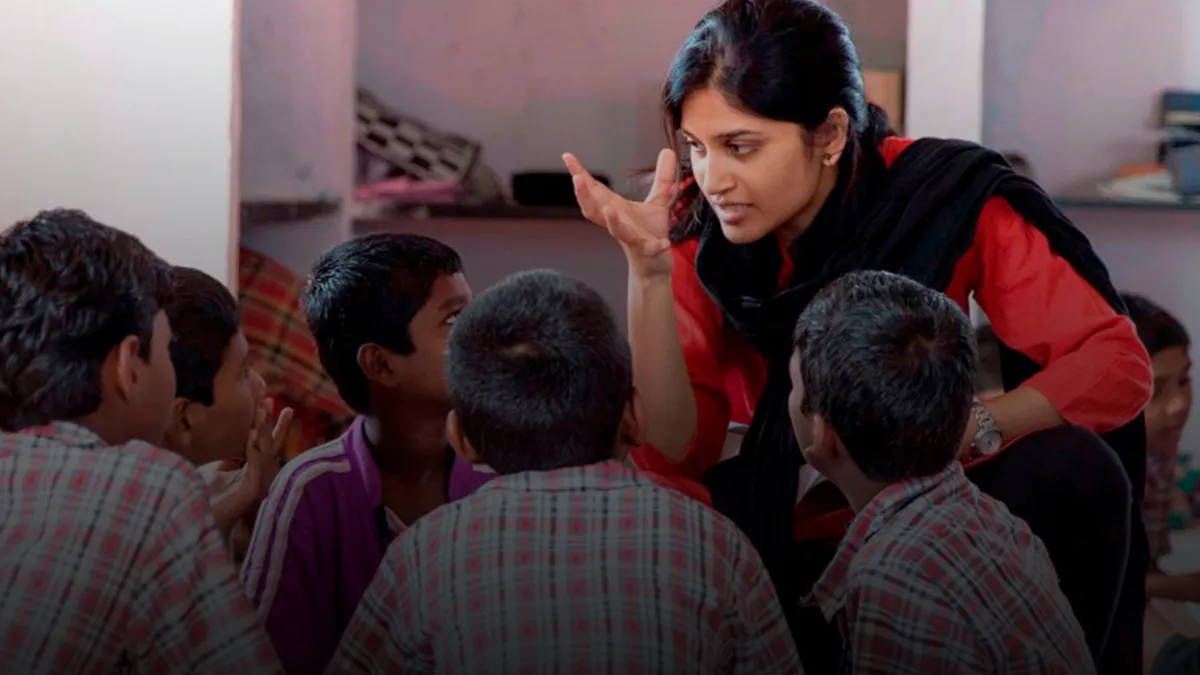THE belief that quality education is the antidote to inequality led Sahithya Anumolu to leave her corporate job and step into the public education sector to work towards this. She found her tribe in Eshwar Bandi and Vivek Piddempally when they trained as Teach For India fellows, and together they co-founded Inqui-Lab. The organisation nurtures problem-solving capacity in the next generation by introducing ‘Design and Innovation’ as an experiential subject in public schools.
In a chat with Give, Sahithya shares her journey in the social sector, how Inqui-Lab is making school children confident and creative, some inventions that have amazed her and much more.
Give: From a Teach For India fellow to co-founding Inqui-Lab, tell us a bit about how you came up with the name and the journey so far.
Sahithya Anumolu: While Teach For India made us educators, the journey towards Inqui-Lab helped my co-founders and me find the puzzle piece within education we wished to work on.
For us, it all started with the first step my co-founder Eshwar took by taking a host of low-cost, disconnected materials to the classroom like batteries, magnets, a solar panel etc. In the classroom, one student put a magnet under a toy car and said that his idea would help prevent tyre punctures. Another student, Sai Priya from a government school in Malakpet in Telangana, wished to make a magnetic cradle that rocks on its own when her baby sister cries so that her mother needn’t wake up multiple times in the night.
Motivated by these initial observations, we began to design a curriculum that would give children an opportunity to use their creative potential and empathy to design useful products. We found that children were innovative, intuitive, and highly observant of the everyday problems around them across all classrooms, irrespective of demographic or academic performance.
With these early learnings, we conceptualised our interventions at Inqui-Lab. The word Inqui-lab was coined by Eshwar and Vivek, meaning Inquiry Lab or Inquilab! Revolution.

From a project in 2017, Inqui-Lab has grown into an organisation that has thus far reached 50,000+ students through in-school and online programmes, generating 20,000+ student ideas submissions. What made this possible? People, passion, and partnerships. We have a dedicated team of 25 purpose-driven individuals and many more consultants, interns and volunteers. In the next three years, we aim to continue to innovate, research, scale, and reach two million children and youth across different geographies.
Give: What was your first experience of the social sector? A moment that is significant to you in some way.
SA: For many in our team, the first deep dive into the social sector was a Teach For India classroom. Through this fellowship, we each got an opportunity to teach in different government or low-income private schools for two years and closely interact and collaborate with up to 200 students each. We saw education as a societal equaliser and wished to contribute towards equitable access to quality education.
My first six months made me realise that intent is one thing but the skill to design, teach, listen, understand the realities and aspirations of students, and tackle and leverage the larger system is another. It served as an excellent 101 to education, pedagogy, and the development sector. This moment is also significant for me as this is where I found my tribe – my co-founders and some of my current teammates. These are also the classrooms where we first piloted the concept of Inqui-Lab.
Give: What is Inqui-Lab Foundation’s “Think & Make” intervention all about?
SA: The Think & Make Program is an in-school intervention for public school students. It is a two-year weekly programme implemented within classrooms or community centres. It utilises peer-led, hands-on experiences and showcases a push to a culture of problem-solving within the learning space.

With team-level workbooks and kits, students participate in multiple units of problem-solving and practice eight important skills and mindsets like design thinking, prototyping, risk-taking, innovative and entrepreneurial mindsets. After an initial successful pilot with 1,200 students (15 Telangana social welfare schools supported by Salesforce), we are now looking forward to working with a more extensive cluster for schools in the coming years with a district or state-level pilot as a three-year goal.
Our second flagship programme, the School Innovation Challenge (also known as UniSolve), aims to be a pioneer in promoting 21st-century skills and design thinking amongst teachers and students. Each participating student undergoes a highly interactive online self-paced mobile-friendly digital curriculum followed by a call for submission of ideas. The best ideas are selected, and the respective teams receive financial and mentoring support to implement them.
In the last year, we’ve also begun to work with college students. We have partnered with an organisation called “Seventh Sense” for a project called “Code Unnati” in collaboration with SAP Labs, United Nations Volunteers, and United Nations Development Programme (UNDP). We have provided an exclusively designed entrepreneurship development learning course for college students who have aspirations to be entrepreneurs in Karnataka. We aim to create a movement of youth changemakers with our college-level initiatives.
Give: Tell us a few of the coolest and most beneficial ideas/inventions of young children that have amazed you.
SA: The ideas that amaze us the most are rooted in empathy. When a student takes the time to pause, empathise and spot a contextual problem in their vicinity, it’s great to see an essential outcome of education and citizenship come alive.
Some recent inventions by students include:
# Multiple purpose bags for agricultural farmers designed by Abhishek, Venu, and Rajesh. Their parents are farmers, and the children had created a simple wearable bag with compartments to carry tools, mobile phones, plucked produce or fertiliser to spray. They made this out of fertiliser bags that are readily available to them, and we collaborated to manufacture 100 units of the multipurpose bag in their community.
# Height adjustable wheelchair that Basheera and team had designed to ensure better mobility and independence for users, especially while alone.
# Hand soap with a fun token inside to encourage hand washing during COVID – made by Satvika.

Some ideas are not necessarily innovations but simple courageous acts of change. Like how students of Zilla Parishad High School, Zoyagaon, Telangana, met the sarpanch of their village and got a roadside ditch filled up for pedestrian safety; or how Sriram collaborated with his headmistress to get all school bathrooms cleaned and sanitised during the start of school, post-pandemic.
Give: Inqui-Lab has gone for online crowdfunding through the Give platform. How has the experience been? Going forward, do you think online crowdfunding will become one of the most important sources for you?
SA: Crowdfunding is an effective way to reach out to individual donors who believe in the cause. We’ve done three crowdfunding campaigns so far, each with an increasing funding target. In this campaign, we’ve raised ₹9+ lakhs via Give and another nine lakhs via direct-to-bank donations. These donations can nurture the problem-solving ability of up to 1,000 solvers and amplify their agency to create change in their communities.
We see crowdfunding as an avenue to raise upwards of ₹20 lakh every year. More than the target amount itself, it also serves as a vital tool for advocacy. We promote many student ideas during this time, and it’s been amazing to see people take out time to donate, cheer and share the crowdfunding link in their circles.
Give: If life had not led you to start Inqui-Lab, what would you rather have done?
SA: We’d all still be in the development or education sector! My transition from corporate to the social sector was very intentional. Some part of my time would be catered to bridging inequalities and providing better access to quality educational and skilling opportunities. My other potential career choices would be youth counsellor or therapist, certified deep-sea diver and trainer, or a blogger.
Give: What are three things you would take with you on a 16-hour flight?
SA: Books, books, books: Currently reading Inside-Out Leadership by Rajiv Vij and Mafia Queens of Mumbai by Hussain Zaidi. And music, with beautiful lyrics like Elliot’s Song from Euphoria and Telugu melodies and documentaries showcasing cuisines, natural landscapes, and must-have experiences of my destination! And a bright smile in search of new adventures.
To read more about Inqui-Lab Inventions Foundation, you can explore and donate here.
Interviewed by Sruthy Natarajan
–
Give’s mission is to “make giving bigger and better.” Give is the most trusted donation platform in India for fundraisers and crowdfunding campaigns. Through our technology solutions, we enable individuals and organisations to fundraise and donate to a cause, charity or NGO with trust and convenience. Give’s community of 2.7M+ individual donors and 300+ organisations supports 3,000+ verified nonprofits with 80G deduction and serves 15M+ people across India. Find a fundraiser today!
Discover more from
Subscribe to get the latest posts sent to your email.

